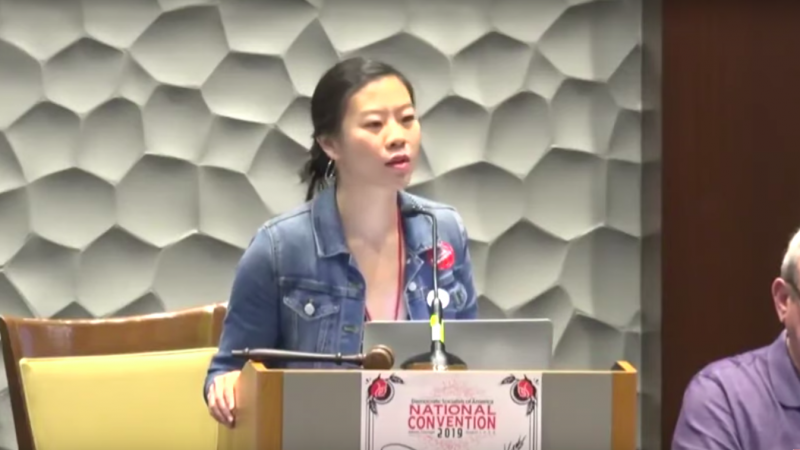At the Democratic Socialists of America Convention, Clapping, Chatter, and Gendered Language Are Considered Triggering
But it wasn't all woke one-upmanship—they also discussed public policy.

Democratic socialists earned some ridicule this weekend after video clips from their annual convention—which showed attendees objecting to clapping, disruptive chatter, and the use of gendered language on grounds that all of these things were triggering—appeared online.
One person took to the podium to thank his fellow comrades for waving their hands in the air instead of clapping, since sudden, loud noises can be harmful for the easily perturbed members of the audience.
"We have a lot of disabled comrades," he said. He reminded everyone to "avoid hissing, avoid waving banners, there's all sorts of things."
It's difficult, of course, to impose total silence on a political action conference. At one point, a convention delegate interrupted another person's speech about "defeating capitalism" to make a "quick point of personal privilege." This delegate began by reminding the audience that he uses "he/him" pronouns, and then implored: "Guys… please keep the chatter to a minimum," because he is "very prone to sensory overload." Immediately after this plea, another attendee shot back with their own point of personal privilege: "Please do not use gendered language to address everyone." This person objected to the previous speaker's use of the word "guys."
It is not at all uncommon to see the DSA sidetracked by infighting over unreasonable requests related to language and disability status. In my book about modern activism—Panic Attack: Young Radicals in the Age of Trump—I describe how the DSA's Medicare for All campaign was criticized by the DSA's disability caucus, whose members claimed that they should have ultimate authority over issues pertaining to health and wellness. It is widely believed within progressive circles that the oppressed are the sole experts on their own oppression and that deference should be given to the most marginalized groups. In practice, this creates some weird standoffs. From my book:
Since disabled people are especially affected by health care policy, the Medicare for All group had essentially failed to let disabled people be the experts on their own oppression—an intersectionality no-no.
Amber A'Lee Frost, a Medicare for All proponent and prominent DSA member known for co-hosting the left-wing Chapo Trap House podcast, hit back, accusing her critics of trying to sabotage the movement with their "pathological anti-social behavior." This made matters much worse: The comment was perceived as an attack on the autistic community.
Frost had committed ableism. Several dozen DSA members signed a petition demanding that she "immediately remove herself from any involvement, official or unofficial, with DSA's Medicare for All campaign, and should she not, that she be removed." This was necessary, because intersectionality means casting suspicion on organizing efforts if these efforts do not make the marginalized the center of attention.
No one should come away from the coverage of the DSA convention with the idea that attendees did nothing but call out each other's pronouns, though. Listening to the livestream, I heard heated discussions about significant policy issues: criminal justice reform, supporting the presidential campaign of Sen. Bernie Sanders (I–Vt.), and combating "Lex Luthor–esque scumbag Jeff Bezos." Of all the various factions of progressive activism, the DSA is by far the most organized, and the least likely to be derailed by culturally woke signaling.


Show Comments (162)